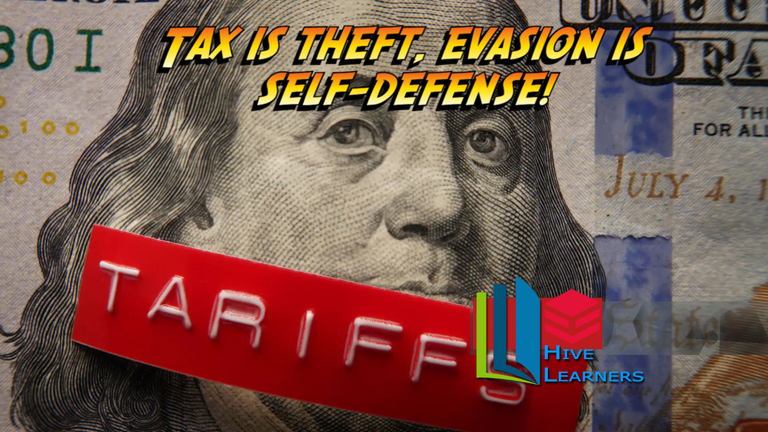[EN/PT] Tax is Theft, Evasion is Self-Defense!
[EN]

“Tax is theft, evading is self-defense!”
This is a phrase I often hear, especially among libertarians here in Brazil. Our country has one of the highest tax burdens in the world. In addition, the system is extremely complex, with countless taxes embedded in practically every economic activity and financial transaction.
From the moment a worker receives their salary to when they buy a product, keep an asset or receive an inheritance from a loved one - who, by the way, has paid taxes all their life on that asset - tax is always present. And the most frustrating thing: all this money collected rarely returns to the population in an efficient way. 😢
Let's start with the tax that is deducted before the worker even sees the money fall into their account: Income Tax, which can reach 27.5% for those with higher salaries. This tax was created to target the richest, who at the time earned more than 10 times the minimum wage. The problem is that, since its creation, the income tax table has hardly been updated. As a result, even those earning less than two minimum salaries now pay tax, which goes completely against the original proposal. A tax created for the richest ended up penalizing the poorest as well.
After receiving their salary, workers go to the market to buy food or clothes, and end up paying a series of taxes built into the final price. Acronyms such as ICMS, PIS, COFINS, IPI, among others, are present on practically everything - and most Brazilians don't even know what they mean. Each product has a different tax rate: beer, for example, can be taxed at up to 46%; soft drinks at around 33%. This variation makes the tax system extremely complex. Many companies even spend fortunes just to keep their tax obligations up to date.
And it doesn't stop there. When someone buys a car or a property, in addition to the taxes at the time of purchase, they still have to pay to keep these assets. In the case of cars, this is the IPVA; in the case of real estate, the IPTU. This means that the taxpayer pays tax on what has already been taxed. A real absurdity! What's worse is that these taxes are calculated based on the value of the asset, and since inflation pushes prices up year after year, citizens end up paying more and more to keep what they already own.
As if all this weren't enough, the tax burden is only set to increase. From time to time, new taxes are introduced or existing ones are increased. A recent example is the controversial “sweater tax”, which started to tax low-value imported products, especially from China. For years, many Brazilians have bought from sites like AliExpress, Shein and Shopee, taking advantage of the exemption for purchases up to 50 dollars. This gave them access to clothes, accessories and electronics at much lower prices than those on the domestic market. But that advantage is now gone.
I confess that I've never been much of a buyer of imported products, but seeing this move by the government, I decided to take advantage of it before the changeover. I bought an IP camera system with real-time recording. Here in Brazil, the same kit would cost around 600 dollars - abroad, I paid just 200, tax-free. I'm even installing the system now and plan to write a detailed post about it soon.

On average, Brazilians pay around 45% of everything they produce in taxes. This includes taxes on income, consumption and assets. According to a google search, Brazilians work about five months a year just to pay taxes. In my case, I pay approximately 60 dollars in income tax, which is equivalent to 12% of my income. And then there are consumption taxes, which vary from 30% to 40%, depending on each person's habits.
At the end of the day, Brazilians feel like they are only working to support the system. The streets remain potholed, hospitals overcrowded, education lacks structure and public services are far from reflecting what is collected. Meanwhile, the tax burden continues to rise, draining more and more of what little the citizen manages to save. It's as if the system charged too much and delivered too little.
If you've made it this far, thank you very much for your time and if this content has been useful in any way, please leave your upvote and reblog!

[PT]

"Imposto é roubo, sonegar é legítima defesa."
Essa é uma frase que ouço com frequência, principalmente entre os libertários aqui no Brasil. Nosso país está entre os que possuem uma das maiores cargas tributárias do mundo. Além disso, o sistema é extremamente complexo, com inúmeros tributos embutidos em praticamente todas as atividades econômicas e transações financeiras.
Desde o momento em que o trabalhador recebe seu salário até quando compra um produto, mantém um bem ou recebe uma herança de um ente querido — que, aliás, já pagou impostos a vida toda sobre esse patrimônio —, o imposto está sempre presente. E o mais frustrante: todo esse dinheiro arrecadado raramente retorna à população de forma eficiente. 😢
Vamos começar pelo imposto que é descontado antes mesmo do trabalhador ver o dinheiro cair na conta: o Imposto de Renda, que pode chegar a 27,5% para quem tem salários mais altos. Esse tributo foi criado para atingir os mais ricos, que na época ganhavam acima de 10 salários mínimos. O problema é que, desde sua criação, a tabela do imposto de renda praticamente não foi atualizada. Com isso, hoje até quem recebe menos de dois salários mínimos já paga imposto, o que vai totalmente contra a proposta inicial. Um tributo criado para os mais ricos acabou penalizando também os mais pobres.
Depois de receber o salário, o trabalhador vai ao mercado comprar comida ou roupas, e acaba pagando, de forma embutida no preço final, uma série de impostos. Siglas como ICMS, PIS, Cofins, IPI, entre outras, estão presentes em praticamente tudo — e a maioria dos brasileiros nem sabe o que elas significam. Cada produto tem uma alíquota diferente: cerveja, por exemplo, pode ter até 46% de imposto; refrigerantes, cerca de 33%. Essa variação torna o sistema tributário extremamente complexo. Muitas empresas, inclusive, gastam fortunas apenas para manter suas obrigações fiscais em dia.
E a coisa não para por aí. Quando alguém compra um carro ou um imóvel, além dos impostos na hora da compra, ainda tem que pagar para continuar com esses bens. No caso dos carros, é o IPVA; nos imóveis, o IPTU. Isso significa que o contribuinte paga imposto sobre o que já foi tributado. Um verdadeiro absurdo! O pior é que esses impostos são calculados com base no valor do bem, e como a inflação faz os preços subirem ano após ano, o cidadão acaba pagando cada vez mais caro para manter aquilo que já é seu.
Como se tudo isso não bastasse, a carga tributária só tende a crescer. De tempos em tempos, surgem novos impostos ou aumentos nos já existentes. Um exemplo recente é a polêmica “taxa das blusinhas”, que passou a tributar produtos importados de baixo valor, especialmente da China. Durante anos, muitos brasileiros compraram em sites como AliExpress, Shein e Shopee, aproveitando a isenção para compras até 50 dólares. Isso permitia acesso a roupas, acessórios e eletrônicos por preços bem menores que os praticados no mercado nacional. Mas essa vantagem acabou.
Confesso que nunca fui muito de comprar produtos importados, mas vendo essa movimentação do governo, decidi aproveitar antes da mudança. Comprei um sistema de câmeras IP com gravação em tempo real. Aqui no Brasil o mesmo kit custaria cerca de 600 dólares — lá fora, paguei apenas 200, isento de impostos. Inclusive, estou instalando o sistema agora e pretendo fazer um post detalhado sobre isso em breve.

Quando se faz uma conta simples, o brasileiro paga, em média, cerca de 45% de tudo o que produz em impostos. Isso considerando tributos sobre a renda, o consumo e o patrimônio. Segundo uma pesquisa no google, o brasileiro trabalha cerca de cinco meses por ano só para pagar impostos. No meu caso, pago aproximadamente 60 dólares de imposto de renda, o que equivale a 12% da minha renda. E ainda tem os impostos sobre consumo, que variam de 30% a 40%, dependendo dos hábitos de cada pessoa.
No fim das contas, o brasileiro tem a sensação de trabalhar apenas para sustentar o sistema. As ruas continuam esburacadas, os hospitais superlotados, a educação carece de estrutura, e os serviços públicos estão longe de refletir o que se arrecada. Enquanto isso, a carga tributária continua subindo, drenando cada vez mais o pouco que o cidadão consegue economizar. É como se o sistema cobrasse demais e entregasse de menos.
Se chegou até aqui muito obrigado pelo seu tempo e se de alguma forma este conteúdo foi útil, deixe seu upvote e reblog!

Posted Using INLEO

Bzzz! Entendo a frustração, Elderdark! O sistema tributário brasileiro é um verdadeiro labirinto. Impostos escondidos em preços e alíquotas variáveis, é como se estivessem nos roubando de forma silenciosa. Fico curiosa para saber como vocês libertários aqui no Brasil avaliam a possibilidade de uma reforma tributária mais justa e eficiente.
#hivebr
AI generated content
Commands: !pixbee stop | !pixbee start | !pixbee price
Obrigado por promover a comunidade Hive-BR em suas postagens.
Vamos seguir fortalecendo a Hive
Hmm, everything we buy has tax in it. One will pay tax from salary and still pay tax in the goods he or she buys from the market. Though taxes are targeted at the rich, some of them don't feel it because they already have enough, in the end, it's the poor that are still. Suffering
Thank you for your witness vote!
Have a !BEER on me!
To Opt-Out of my witness beer program just comment STOP below
If the air we breathe can fetch them money, they are ready to tax it.
Your post was manually curated by @shiftrox.
Delegate your HP to the hive-br.voter account and earn Hive daily!
🔹 Follow our Curation Trail and don't miss voting! 🔹